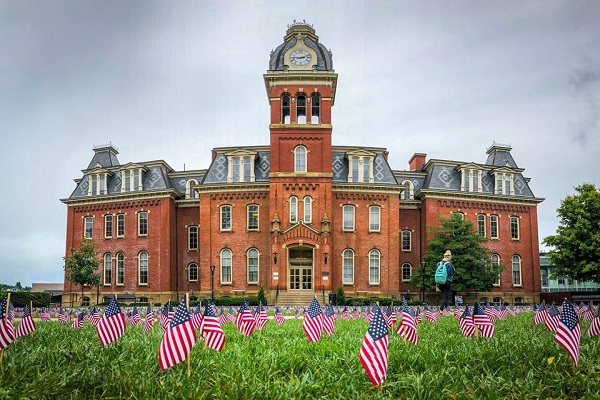In a grand celebration of history, achievement, and forward-thinking, West Virginia University (WVU) marks 157 years since its founding. As the state’s flagship public institution, WVU has become synonymous with academic excellence, cutting-edge research, and a deep-rooted commitment to community service. The university’s journey from its humble beginnings to its current status as a major educational and research hub has been nothing short of extraordinary.

A Journey Through History: From Humble Beginnings to a Leading Institution
West Virginia University was established on February 7, 1867, in Morgantown, West Virginia, just four years after the state itself was formed during the tumultuous period of the American Civil War. Originally named the Agricultural College of West Virginia, the institution was created under the provisions of the Morrill Land-Grant Acts, which aimed to provide accessible education in agriculture, science, and engineering to the working class.
The early years of WVU were marked by growth and adaptation. In 1868, the university was renamed West Virginia University, reflecting its expanded mission beyond agriculture to include a broader range of academic disciplines. The first graduating class consisted of just six students, but it set the stage for the university’s role as an educational leader in the region.
Over the decades, WVU has continually evolved, expanding its academic offerings, building state-of-the-art facilities, and fostering a vibrant campus life. The university’s commitment to innovation and progress has allowed it to grow from a small college to a major research institution that serves over 30,000 students and employs thousands of faculty and staff.
Academic Excellence: A Tradition of Scholarship and Research
At the heart of WVU’s success is its unwavering dedication to academic excellence. The university offers over 350 undergraduate, graduate, and professional programs across 14 colleges and schools. These programs span a wide range of disciplines, from traditional fields like the humanities and natural sciences to emerging areas such as cybersecurity and energy research.
WVU is particularly renowned for its research initiatives. As a land-grant institution, the university has a long history of conducting research that directly benefits the state of West Virginia and beyond. The university’s research enterprise is supported by over $200 million in annual research funding, and WVU has earned recognition as a Carnegie R1 institution, a designation that highlights the highest level of research activity.

One of the university’s most notable research achievements is in the field of energy and environmental sciences. Given West Virginia’s rich natural resources, WVU has become a leader in energy research, focusing on clean energy technologies, sustainable mining practices, and environmental protection. The university’s National Research Center for Coal and Energy and its Water Research Institute are just two examples of the many centers that contribute to this vital work.
In addition to its strengths in energy research, WVU is also making significant strides in healthcare. The university’s Robert C. Byrd Health Sciences Center is a major hub for medical education, research, and patient care. WVU Medicine, the clinical arm of the university, provides world-class healthcare to the people of West Virginia and serves as a training ground for the next generation of healthcare professionals.
Community Engagement: A Deep Commitment to Service
WVU’s commitment to community engagement is a cornerstone of its mission. The university’s motto, “Mountaineers Go First,” reflects its dedication to leading the way in service to others. This commitment is evident in the university’s numerous outreach programs, which aim to improve the quality of life for people in West Virginia and beyond.
The WVU Extension Service is one of the university’s most impactful community engagement initiatives. Established in 1914, the Extension Service brings the university’s resources to every corner of the state, offering educational programs in agriculture, health, youth development, and more. Through its network of county offices, the Extension Service helps farmers, families, and communities address local challenges and seize opportunities for growth and development.
Another key aspect of WVU’s community engagement is its dedication to public service. The university encourages students to participate in service-learning opportunities that allow them to apply their academic knowledge to real-world problems. WVU students contribute thousands of hours of volunteer service each year, working on projects that range from disaster relief efforts to mentoring local youth.
WVU’s influence extends beyond state lines as well. The university has established partnerships with institutions around the world, enabling students and faculty to engage in global research and service initiatives. Whether through study abroad programs or international research collaborations, WVU is preparing its students to be global citizens who can make a positive impact on the world.
Celebrating 157 Years: A Year-Long Commemoration
To commemorate its 157th anniversary, WVU has planned a year-long series of events and activities that celebrate the university’s rich history and bright future. These celebrations are designed to bring together the WVU community—students, faculty, staff, alumni, and friends of the university—and highlight the many achievements that have defined the institution’s past and will shape its future.
The anniversary celebrations kicked off with a special Founders Day event on February 7, 2024, featuring speeches from university leaders, performances by student groups, and the unveiling of a new historical exhibit that traces WVU’s journey over the past century and a half. The exhibit, housed in the university’s Wise Library, includes rare artifacts, photographs, and documents that tell the story of WVU’s growth and transformation.
Throughout the year, WVU will host a series of lectures, panel discussions, and cultural events that reflect the university’s diverse academic and social life. These events will cover topics ranging from the history of land-grant universities to the future of higher education in a rapidly changing world. The university’s academic colleges will also be hosting open houses and special events that showcase their contributions to WVU’s legacy.
In addition to on-campus events, WVU is reaching out to its alumni community with regional celebrations across the country. These gatherings provide alumni with an opportunity to reconnect with their alma mater, celebrate the university’s achievements, and learn about the exciting developments happening at WVU today. The university’s alumni network is more than 200,000 strong, with graduates living in all 50 states and in countries around the world.
The year of celebration will culminate in December 2024 with a special Convocation ceremony, where university leaders will reflect on WVU’s past and look ahead to the future. This event will also honor distinguished alumni and faculty members who have made significant contributions to the university and society.
Looking Ahead: A Future of Innovation and Impact
As West Virginia University celebrates its 157th anniversary, it stands at a crossroads, poised to build on its legacy of excellence and innovation while addressing the challenges of the future. The university’s leadership has outlined an ambitious strategic plan that focuses on enhancing academic quality, expanding research, and deepening community engagement.
One of the key areas of focus for WVU’s future is the continued development of its research capabilities. The university is investing in new facilities and resources that will support cutting-edge research in areas such as renewable energy, artificial intelligence, and healthcare innovation. These efforts will not only advance knowledge but also create new opportunities for economic development in West Virginia and beyond.
WVU is also committed to making higher education more accessible and affordable. The university has launched initiatives to increase financial aid, improve student retention, and provide more support for first-generation college students. By removing barriers to education, WVU aims to ensure that more students can achieve their dreams and contribute to the prosperity of their communities.
As the university looks to the future, it remains deeply rooted in its land-grant mission of service to the people of West Virginia. WVU’s commitment to community engagement will continue to be a defining feature of its identity, as the university works to address the most pressing issues facing the state and the nation.
Conclusion: A Legacy of Leadership
West Virginia University’s 157th anniversary is not just a celebration of the past but a reaffirmation of its commitment to the future. As the university continues to evolve and grow, it remains dedicated to its core values of academic excellence, research innovation, and community service. The legacy of WVU is one of leadership, resilience, and a steadfast belief in the power of education to transform lives and communities. As Mountaineers go first into the next chapter of the university’s history, they carry with them the spirit of excellence that has defined WVU for over a century and a half.









